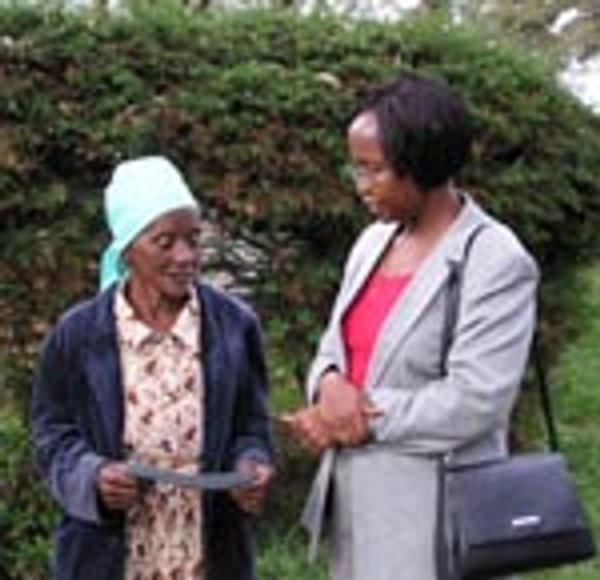A total of 465 women have benefited from the project over the past two years in the three villages of Ngong, Ngarariga and Riara, with the participation of 45 university students and a Course Director, Mrs. Susan Kinyua. The project is run under the auspices of Kianda Foundation and the European Union, through the Institut zur Cooperation Bei Entwicklungs-Projekten (ICEP).
The university students are selected and trained in an intensive one-week course given by the Course Director, in which they are put in the picture of where the women are coming from and where they are to go, followed by a period of personal preparation through Personality Development Sessions and research. During this time the students visit the homes of the women who have been recommended by the local Community Development Office and complete a questionnaire.
Once the 60-70 women to benefit from the project have been selected, the 14 or so university students start the training. After one month each woman is asked to come up with her own business plan, which she makes with the help of the students. They then agree on the amount she needs to start that business and it is given to her with finances provided by EU, ICEP and KF. The students, together with the Course Director, visit the women weekly over a period of 6 months to see how they are getting on and from their profit the women repay in weekly or monthly instalments 20% of the amount they were given.

An important part of the training given to the women by the Course Director is “Life Skills,” or the virtues required for life: honesty, cheerfulness, service, hygiene, etiquette… which redound in benefit of their families and society at large. As Mrs. Kinyua puts it: “The project cuts across the person; she learns to use things better, to be clean… and an immediate consequence is that she acquires confidence. One of the women told me that she feared so much that if she started anything she would fail that she sat at home, immobilized by fear. After the project she said that she is respected by her husband, there are fewer quarrels, because she brings something home. Now this woman is encouraging her friends, telling them to start because ‘you can do it!’”
Another woman was widowed, lost her property and had to leave her children with her mother because she had nowhere to put them. “If I am alone I can ask for a night’s shelter from anyone and get by,” she thought. Through the project, this woman was able to find a place in the slum to start her small business and managed to build a house and bring her children home.

“What the women appreciate most,” says Mrs. Kinyua, “more even than the money, is the Life Skills we give. It helps them to live with other people. They see we are really concerned about them, and ask “Will you continue advising us even when the project is over?’ and we try to do that.”
“The university students also benefit from their participation in the project,” says Mrs. Kinyua. “They learn to appreciate the education they received, and a number of them have continued the project in their own home area, teaching the women in the village.
A closing ceremony was held on March 22, 2005, in the village of Ngarariga, in which certificates were presented to 80 women who had participated in the TOT project. The guest of honour for the occasion was Mrs. Regina Gitau, the Kiambu District Adult Education Officer. Mr. Titus Katembu of the European Union also attended. The two gave speeches in which they encouraged the women to continue their businesses and to aim at improving them. After the speeches the women were awarded their certificates. They were all very excited since for most of them it was the first certificate they had ever received in their lives. A congratulatory cake made in Kibondeni College, a corporate apostolic work of Opus Dei, was cut in order to celebrate the occasion.
